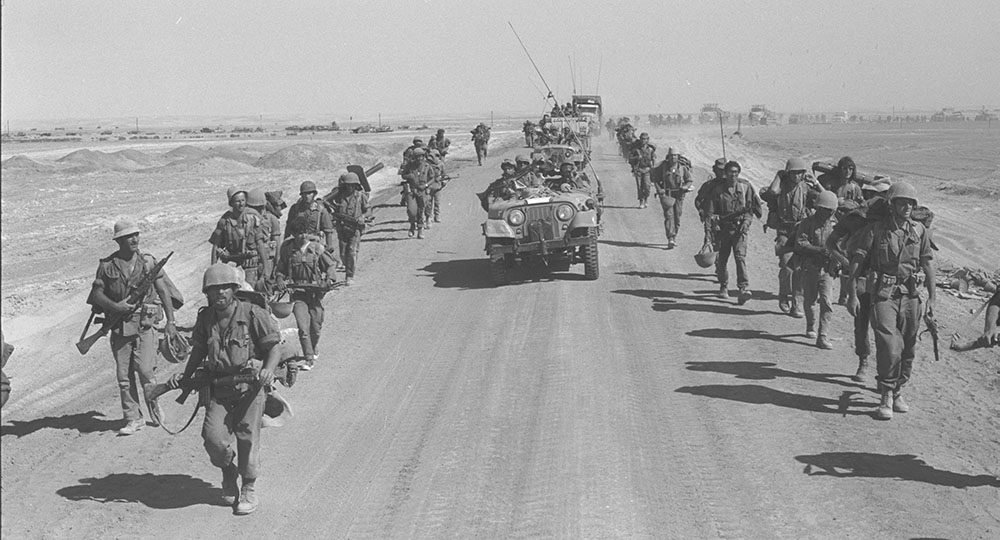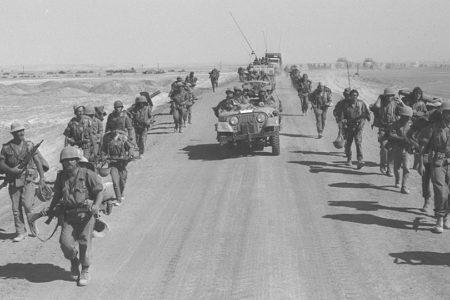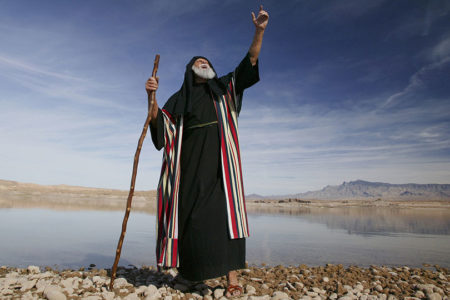No Surprises, Please
On October 6, 1973, 40 years ago, Israel was wrapped in prayer shawls, observing the holiest of Jewish religious observances, the Day of Atonement (Yom Kippur). Radio was silenced; transportation, public and private, was off the streets.
On the Bar Lev Line in the Sinai, as well as on the Golan Heights, Israeli troops were pared down to a skeleton force. It was the one day each year when the nation’s citizens stood before God in silence and contemplation, removed from the frenzy of the world around them.
The silence that day, however, would be short-lived. At 2:00 in the afternoon, Egyptian forces crossed the Suez Canal, overran the young soldiers manning the Bar Lev Line of defense, and pushed into the Sinai. Simultaneously, the Syrians sent hundreds of tanks streaming into the Golan, crushing the opposition and taking control of most of the southern portion of the Golan Heights. History records, “On the Golan Heights, 150 Israeli tanks faced 1,400 Syrian tanks and in the Suez region only 500 Israeli soldiers fought 80,000 Egyptian soldiers.”1
Over the next few traumatic days, while Israeli reserves were being organized and deployed to meet the attacks, enemy forces were creating a havoc that threatened the very existence of the Jewish state. When Israel launched its first counterattack on October 8, its forces were repelled in a near catastrophic loss of planes, tanks, and equipment.
Israel needed its allies, and needed them desperately. The Egyptians, with the largest Arab army in the Middle East, pressed the attack as the Russians poured in military supplies to try to ensure an Arab victory. It was alleged, and probably with good reason, that it was the Russians who suggested Yom Kippur as the best day to begin the war.
In the meantime, Israel looked for help from its chief ally, the United States. In a revealing postwar interview, then President Richard Nixon said he asked Secretary of State Henry Kissinger how many of America’s large cargo planes were being used to supply the Israelis. When Kissinger replied two or three, Nixon asked, “How many do we have?”
“Twenty-five,” the secretary replied.
“Send them all,” Nixon said.
True allies provide more than warm words and best wishes when a friend is being threatened with annihilation. There are perhaps few better examples of quality friendship than that shown Israel during the Yom Kippur War of 1973.
By October 10, when the tide began to turn in favor of Israel, Egypt and Syria cried for Russia to intervene. Bolstered materially by American supplies and equipment, Israelis were on their way to Damascus in the north and Cairo in the south. As Egyptian President Anwar Sadat urged the Russians to petition the UN for a ceasefire, the war moved into a larger arena. The two superpowers, the United States and Soviet Union, seemed ready to collide.
As it became increasingly obvious the Israelis were defeating the Arab invaders, the Soviet ambassador to the United States, Anatoly Dobrynin, told Kissinger that Soviet airborne troops were preparing to intervene to save Damascus, Syria. If the Soviets intervened, said Kissinger, they would be met by American forces. The United States would not tolerate Russian intervention, even if it brought the two powers to the brink of nuclear confrontation. The Soviets backed down.
When hostilities finally ceased, people began to ask, “How could this have happened?” For the first time in its modern history, Israel was caught by surprise. Israeli Prime Minister Golda Meir explained that, though informed of the amassing Egyptian and Syrian forces, she did not order a preemptive strike because she did not want Israel to be accused of firing the first shot. If there was to be war, Israel’s enemies would have to strike first.
It was a near fatal decision. More than 7,000 Israeli soldiers were killed or wounded, and many distinguished military and political careers were almost destroyed, including that of Defense Minister Gen. Moshe Dayan, a hero in the 1967 Six-Day War, who resigned in disgrace.
In the aftermath, a national state of depression set in. A prominent Israel Defense Forces general told me in 1975, “It is only now, after all this time, that our people are beginning to recognize that we actually won the war.” What was lost, however, was the sense of invincibility that had invigorated Israel after the Six-Day War and perhaps had made many overconfident.
What befell Israel in 1973 is not simply fodder for a disposable page of history. In this day and age, we had better take seriously the components that cause a country to win or lose.
Israel’s enemies are as devoted to its annihilation today as they were in 1973. As much as we’d like to ignore the grim reality, every free, democracy-loving country in the world is in a constant state of war with people determined to destroy it. That is why bodies were shredded in the streets of Boston in April; dedicated American soldiers were murdered in November 2009 at Fort Hood, Texas, by a terrorist shouting “Allahu Akbar” (“Allah is great”); and the World Trade Center in New York City was destroyed in September 2001. The shout “Allahu Akbar” frames the declaration of perpetual war, certified by vengeful attacks on innocent people.
If a democracy is to exist, it has only one option: survival through strength. In 1973 Israel was determined to see the conflict through and win, demonstrating its understanding of the consequences of failure. Decades earlier, many Israelis had experienced in Europe the effects of such deep hatred and had not forgotten its blood-soaked ugliness.
Friendship is a virtue that has charted the course between Israel and the United States for 65 years. In 1948 President Harry Truman, against almost all advice, made America the first country in the world to officially recognize the State of Israel. Nixon did not shrink from Russian imperialists and was willing to fight to prevent the destruction of a trusted ally. In 1917 and during the war-torn years of the 1940s, Americans marched to the aid of their allies, valued as friends in need.
A war of words waged on the floor of a debating society can be entertaining and concluded with no casualties. Unfortunately, reality doesn’t work that way. For more than two centuries, Americans have lived relatively secure, safe, healthy, and prosperous lives in a country that has kept us free. The United States of America has been a bulwark of strength—moral, industrial, and military. We have demonstrated fidelity to our Constitution, maintained a reasonable political consensus, and had unwavering love for our country.
Are all these things slipping away? In many respects, the answer is yes. The greatest dangers we face today are from within. A great infiltration has occurred and is destroying the society and culture that have made America great. We must decide whether to surrender or survive.
Scripture provides the wisdom America needs: “Blessed is the nation whose God is the Lᴏʀᴅ” (Ps. 33:12). Believing that truth would be a step in the right direction.
ENDNOTE
- Rit Nosotro, “Moshe Dayan,” October 2003 <hyperhistory.net/apwh/bios/b1dayan-moshe.htm>.







